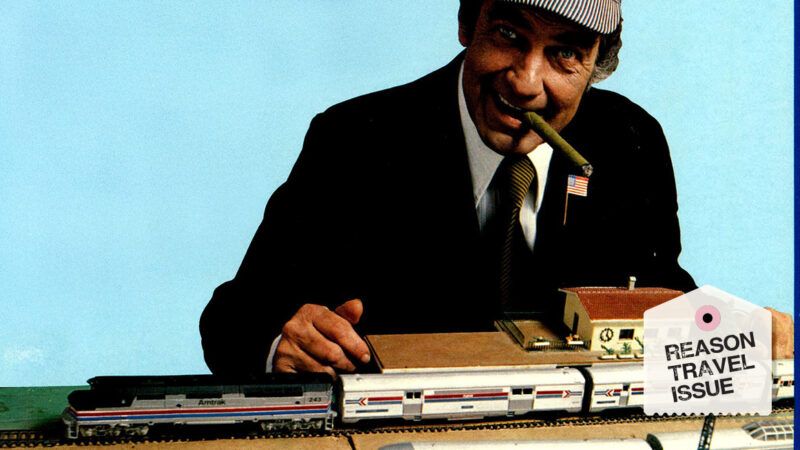Archives: August/September 2025
Travel excerpts from Reason's vaults

4 years ago
May 2021
"A common refrain during the Obama administration, echoed by both major-party presidential nominees in 2016, was that people in the FBI's Terrorist Screening Database, which includes the no-fly list, should not be allowed to buy guns. Using the list to abridge civil liberties was a bad idea then, and it's a bad idea now. The no-fly list is a civil liberties nightmare: secretive and nearly impossible to challenge."
C.J. Ciaramella
"The No-Fly List Is a Civil Liberties Nightmare"
20 years ago
March 2005
"It is correct that airline security should be rethought from the ground up. But ground-up rethinking should really start at the ground. The [Transportation Security Administration (TSA)] should be eliminated, not refocused….TSA security measures have been inconsistent and mindlessly reactive. This is because bureaucracies are poor at assessing and balancing risk. They are much better at surfing public opinion and following political cues. Witness the TSA's obsession with small, sharp things early in its tenure and the shoe fetish it adopted after Richard Reid demonstrated the potential hazards of footwear. This is not a foresighted, research-based, risk-assessing organization."
Jim Harper
"Transportation Security Aggravation"
29 years ago
October 1996
"The nation's airports are now owned by local government authorities, and federal law requires the authorities to deposit their revenue into a reserve fund for airport improvements—a provision that has prevented private companies from buying commercial airports. No investor would sink money in a venture if all its profits had to be reinvested in the airport. The Federal Aviation Authorization Act of 1996 (H.R. 3539), however, would allow the Department of Transportation to exempt as many as five commercial airports from the reinvestment rule."
Marc Levin
"Flight Plan"
40 years ago
November 1985
"The history of transportation technology is the search for greater speed at decreased cost in resources, safety, and investment. This search has been stifled over the last 11 years by the 55-mile-an-hour speed limit, to the detriment of us all. It is as if the government had decreed in the '50s that airplanes were going fast enough and that no aircraft could surpass the speed of the DC-6. What a world of benefits would have been lost! The case against 55 is overwhelming, but help from our legislators in Washington does not appear to be forthcoming."
Alan Pisarski
"Deep-Six 55"
44 years ago
May 1981
"In 1970, when Congress and the Nixon administration agreed to continue passenger rail travel in the face of growing public preference for auto, bus, and plane, a modest $40 million was put up to get Amtrak rolling. In 1981 Amtrak is still rolling, and the taxpayers now are laying down nearly $900 million a year for it. Amtrak officials enthusiastically predict that the system will soon achieve 'a permanent and ever more crucial role in our national transportation system.' More realistically, the Interstate Commerce Commission notes that 'Amtrak seems to have stabilized into a position of permanently subsidized operations.'"
Jeffrey Shedd
"Amtrak: Congress's Toy Trains"
46 years ago
February 1979
"These are heady times for supporters of the free market. For the first time in US history, an entrenched regulatory body—the Civil Aeronautics Board—has had its powers emasculated and is targeted for outright abolition, in 1985. As a result of the partial deregulation already accomplished, air transportation is booming, with both falling prices and rising airline profits."
Robert Poole Jr.
"Lessons of Deregulation"
48 years ago
April 1977
"The [Interstate Commerce Commission] was the very first of the regulatory agencies—though today it is by no means the biggest. It presides over more than 2,000 employees, spread among 78 offices throughout the United States. It operates on a yearly budget of around $34 million. It writes and distributes hundreds upon hundreds of rules, decisions, regulations and findings in the transportation industry yearly. Included in its bureaucratic grasp are all railroads, and parts of trucking, pipeline and interstate water carriers. It acts as a court—judge and jury—in numerous disputes each year, and makes decisions in those disputes which affect each and every American citizen. And those decisions and directives operate to damage the American consumer in the yearly amount of not mere millions of dollars, but to the tune of billions."
Timothy Condon
"Abolish the ICC!"
